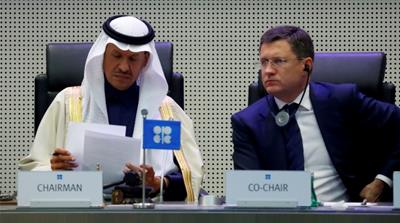Will coronavirus get the better of OPEC and its allies?
Saudi Arabia has been pushing for weeks for deeper oil output cuts to blunt coronavirus fallout but Russia has resisted.

Russia is delivering a sobering lesson in patience and the limits of influence to OPEC kingpin Saudi Arabia as the cartel and its allies gather in Vienna for a two-day meeting kicking off Thursday to agree – or not – on how to respond to the spreading coronavirus outbreak.
In the weeks leading up to the gathering of the Organization of Petroleum Exporting Countries (OPEC) and its allies, a grouping known as OPEC+, the Saudis have reportedly pushed for an extension of existing output curbs as well as additional cuts of more one million barrels per day (bpd).
Keep reading
list of 4 itemsOPEC+ agrees voluntary oil production cuts
Will food prices get higher?
Iraq approves record $153bn budget aimed at creating jobs
So far though, Russia – OPEC’s most crucial ally – has remained cagey about its willingness to sign on to that strategy.
On Tuesday, the group’s technical panel recommended a cut of 600,000 bpd to one million bpd as well as an extension to the end of 2020 current 2.1 million bpd curbs.
“If the cartel surprises to the upside, we might see a bit of relief for oil producers,” Jim Krane, energy analyst at Rice University’s Baker Institute, told Al Jazeera. “If the Saudis can’t bring Russia on board, expect the depredations to continue.”
Prices of benchmark Brent crude are down around 20 percent this year, as concerns mount over how the coronavirus outbreak could dent global energy demand and exacerbate an existing supply glut.
Earlier this week, Russian President Vladimir Putin indicated that he is open to extending current production curbs which OPEC agreed to in December and are set to end in March. But Putin also said Russia is in no rush and could withstand a drop in crude prices.
That is bound to frustrate the Saudis given that the International Monetary Fund reckons the kingdom needs oil to trade at $83 to balance its state budget. Meanwhile, Moscow needs crude to fetch around $42 a barrel to break even.
On Wednesday, Brent crude was trading at $52.08 a barrel.
Coronavirus fallout
Coronavirus has rattled global markets as fears of a recession in the US and international markets mount. The spread of COVID-19, as the disease is formally known, is slowing in China where the outbreak started late last year but is gaining momentum in other parts of Asia, Europe, the Middle East, and the Americas.
Coronavirus has spread to at least 80 countries with more than 93,000 confirmed cases – the majority of which are in China. The total death toll from the outbreak is more than 3,000.
The epidemic is having major impacts on economies- shuttering factories in China, disrupting global chain supplies, cancelling major conferences, and curtailing tourism and travel.
China, the world’s biggest importer of oil, has slashed its crude intake in recent weeks as authorities locked down cities and implemented quarantine measures.
The International Energy Agency in February said that global oil demand in the first quarter of 2020 was expected to fall by 435,000 bpd from a year earlier – that would mark the first in-demand drop since 2009, when the globe was in the grips of a financial crisis.
Some analysts and traders fear that oil consumption may not grow at all this year. Should that happen, it would be only the fourth time in almost 40 years.
An underwhelming response
As forecasts are ratcheted down and expectations for a quick recovery evaporate, the Saudis have reportedly sounded the alarm with fellow oil producers.
“The Saudis were looking for a cut of 300,000 barrels a day. Now, they seem to be upping that to as much as a million,” said Krane. “Since traders are predicting a drop in demand of two-to-three million barrels a day, the Saudi proposal looks about right.”
In an unexpected move, the US Federal Reserve on Tuesday implemented its first, and biggest, surprise interest rate cut since 2008, as policymakers warned that “coronavirus poses evolving risks to economic activity”.
The move came after global stock markets took a battering last week, with the Dow Jones Industrial Average experiencing its biggest weekly drop since the 2008 financial crisis.
”OPEC
will not be able to significantly offset the impact of sharp declines in Chinese growth.”]
While stocks and oil prices spiked on news of the rate cut, the euphoria quickly faded, injecting more volatility into an already jittery market.
“The US Federal Reserve cut interests rates to increase liquidity, and it did stabilize oil prices, but it also worried many traders because it revealed a greater concern about the impact of the virus on the overall global economy,” Tarik Yousef, director at Brookings Doha Center, told Al Jazeera.
Russia’s ‘holding position’
While many of OPEC’s 23 members struggle to balance their national budgets, on Sunday President Vladimir Putin said that Russia could withstand a lower price in oil but was open to discussions with its partners.
Russia’s position is in line with its history of withholding cooperation with OPEC, only to agree to a last-minute cut.
Last week, Saudi Arabia’s energy minister Prince Abdulaziz bin Salman expressed confidence that OPEC+ would agree to further production cuts.

“Russian-Saudi price management has been cordial but not necessarily smooth,” Laura James, senior Middle East analyst at Oxford Analytica told Al Jazeera.
“Cooperation is likely to continue, but cautiously. Moscow and Riyadh are likely in the end to agree, and press partners to fall into line,” said James.
On Tuesday, the vice president of Russian oil giant Lukoil, Leonid Fedun, told Reuters that the proposal to cut one million bpd would be enough to prop up the oil market, adding, “We are ready to cut as much as we are told to. Better to sell less oil but at a higher price.”
Algeria’s energy minister and OPEC President Mohamed Arkab also gave a boost of confidence, telling state news agency APS that there was already “consensus between OPEC and non-OPEC, including Russia”.
Russia’s energy minister, Alexander Novak, met with his Saudi counterpart on Wednesday for bilateral talks as ministers arrived in Vienna to kick off the conference. There is no word yet on whether they found common ground.
But even if they do, analysts warn coronavirus could still prove a formidable challenge to oil producers.
“OPEC can only do so much to mitigate the economic impact of the coronavirus,” Yousef of Brookings Doha said.
“OPEC will not be able to significantly offset the impact of sharp declines in Chinese growth, the impact on Asian and US markets, which has its worst week since 2008, as well as the impact on the airline industry and global manufacturing.”